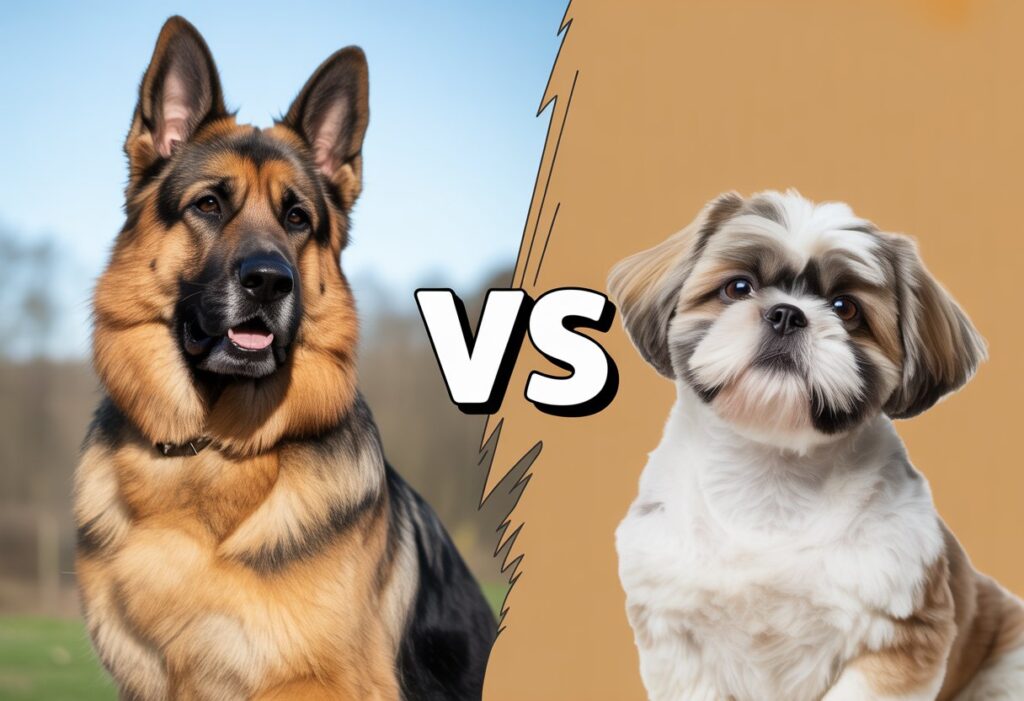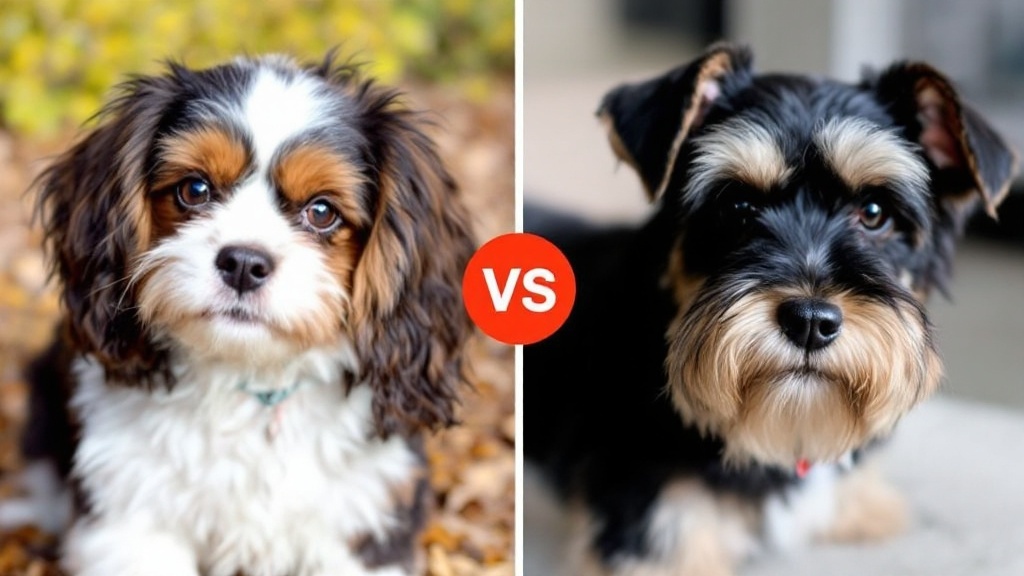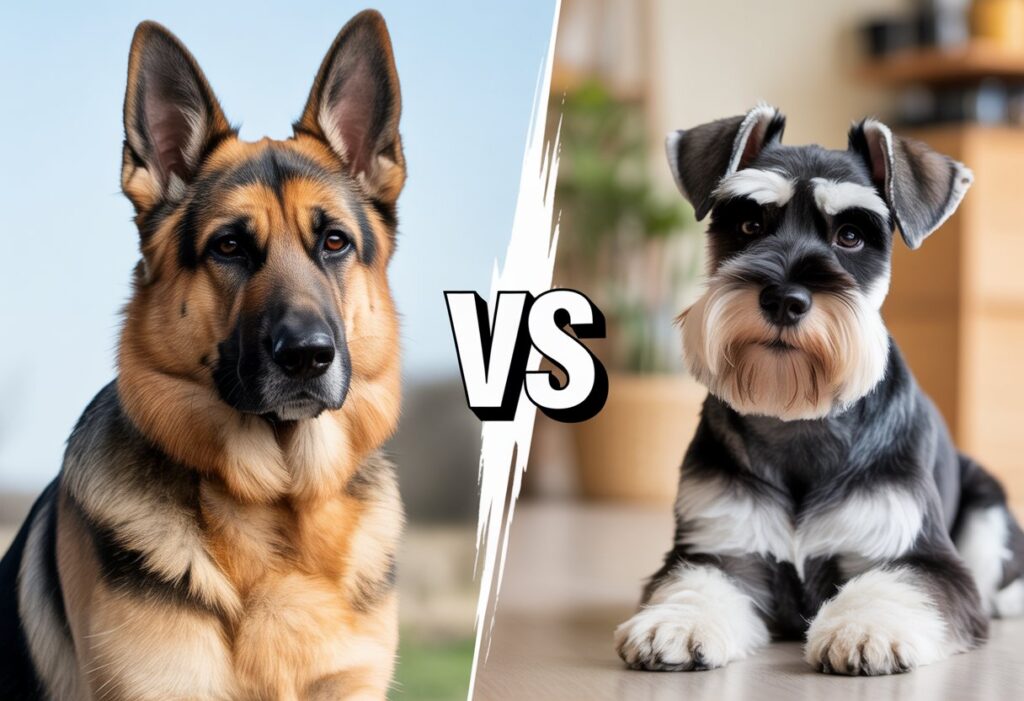Are you thinking about adding a new dog to your family and can’t decide between a German Shepherd and a Shih Tzu? These two breeds are very different, but each brings special strengths.
If you want a loyal, hardworking dog that needs room to play, a German Shepherd may be right for you. A Shih Tzu is better for those who prefer a small, friendly companion for indoor living.
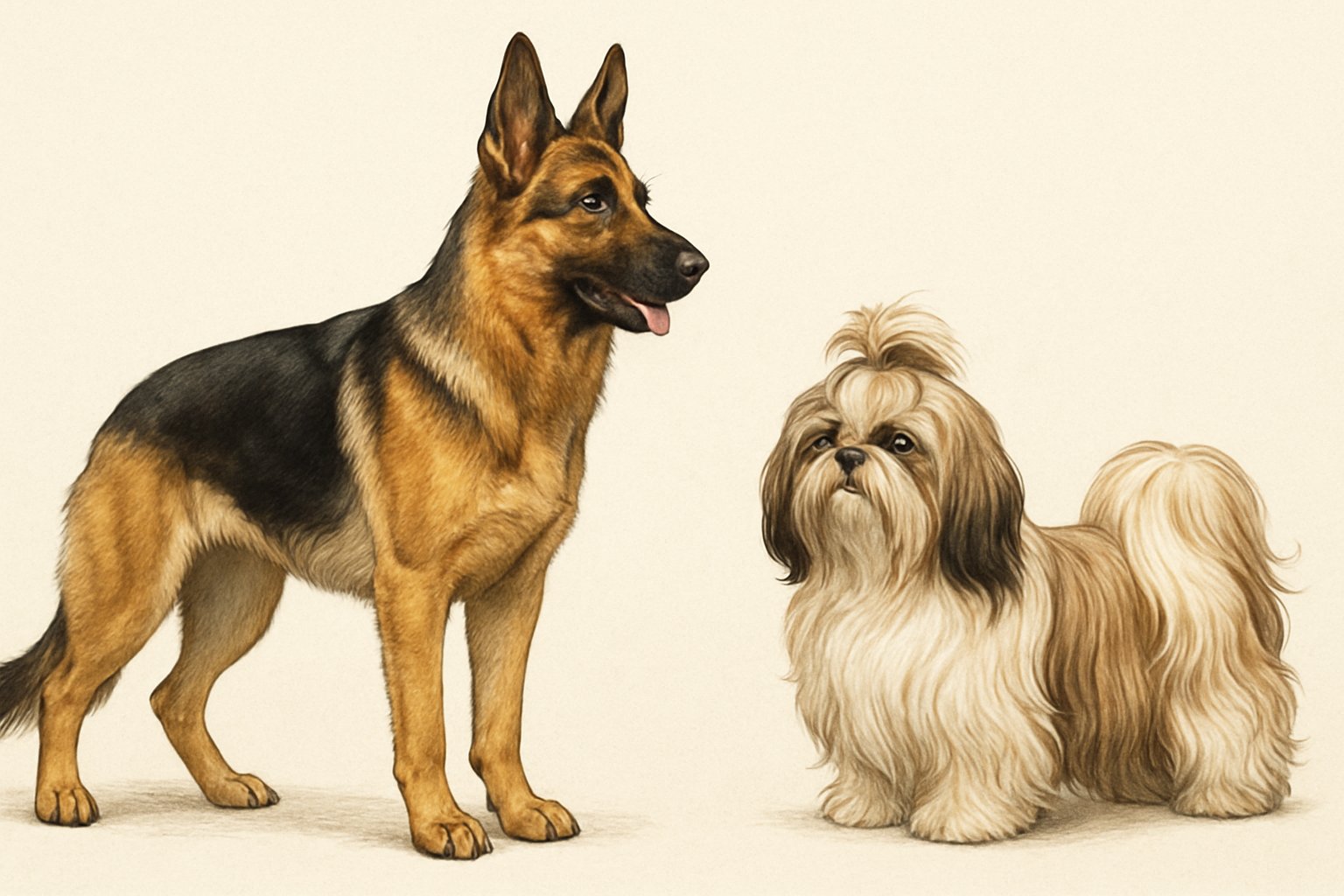
German Shepherds are strong and smart. They were originally bred for herding and police work.
Shih Tzus are small and loving. People know them for their affectionate nature and easygoing attitude.
By comparing their histories, personalities, and care needs, you can choose the best pet for your lifestyle.
Key Takeaways
- German Shepherds and Shih Tzus have different origins and appearances.
- Each breed has a unique temperament and care needs.
- Choosing the right dog depends on your living space and daily routine.
Breed Origins and History
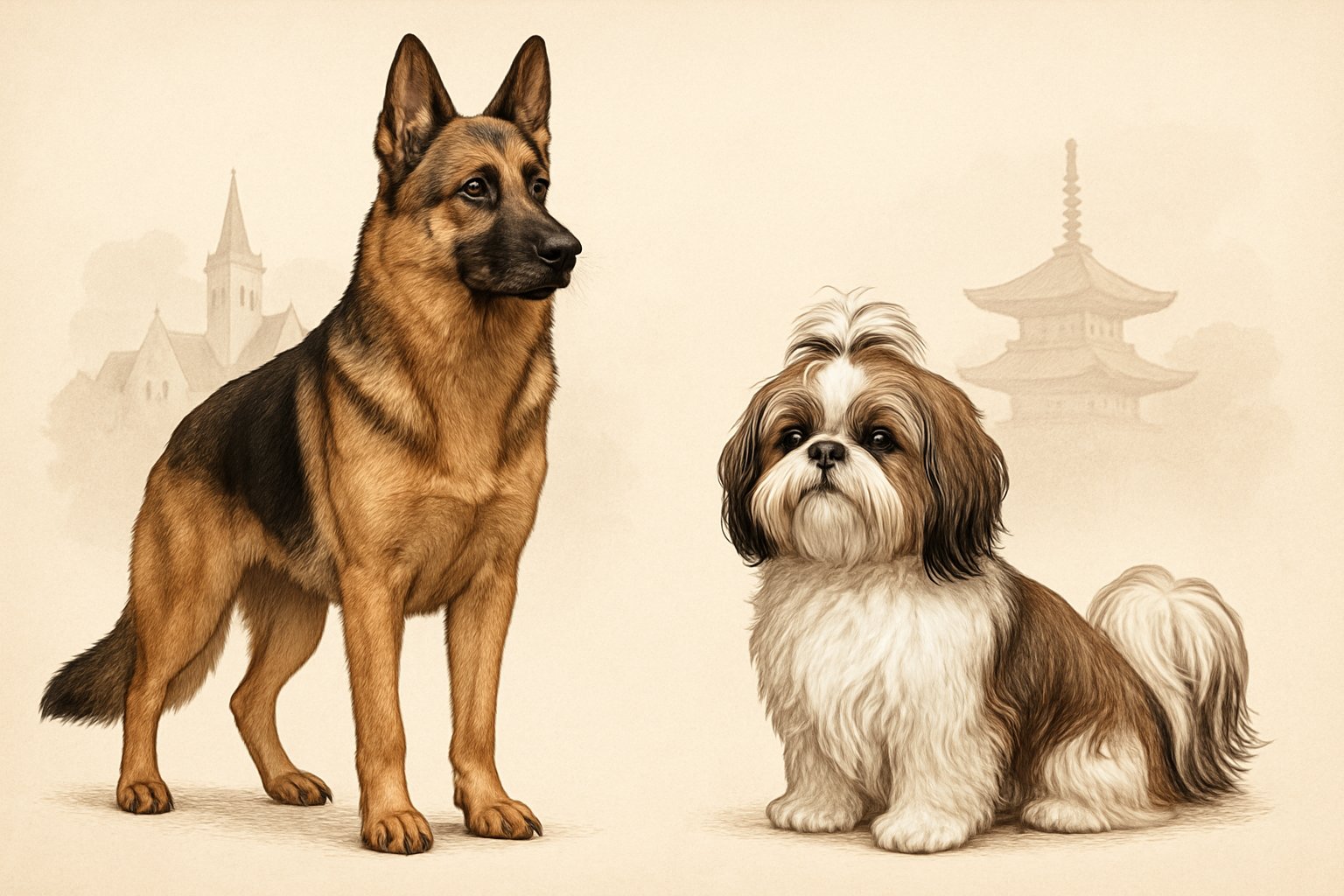
German Shepherds and Shih Tzus started out in totally different worlds. Each breed’s story helps explain their unique looks, personalities, and skills.
German Shepherd Heritage
German Shepherds come from Germany, first bred in the late 1800s. Captain Max von Stephanitz is credited as the founder.
He wanted a dog that was smart, strong, and easy to train. These dogs herded sheep and protected farms.
Their intelligence and loyalty soon made them favorites with police and military. The breed caught on in the United States in the early 1900s.
The American Kennel Club (AKC) recognized the German Shepherd in 1908. Now, they’re valued as guard dogs, service animals, and loyal companions.
Shih Tzu Background
Shih Tzus have roots stretching back over a thousand years in China. They were bred as companion dogs for Chinese royalty, especially during the Ming and Qing dynasties.
Palace breeders prized Shih Tzus for their small size and glorious, flowing coat. These little dogs enjoyed the royal treatment.
The breed eventually made its way to Europe, then the United States in the 20th century. The AKC recognized the Shih Tzu in 1969.
Today, people love Shih Tzus for their friendly nature and charming looks.
Physical Characteristics and Appearance
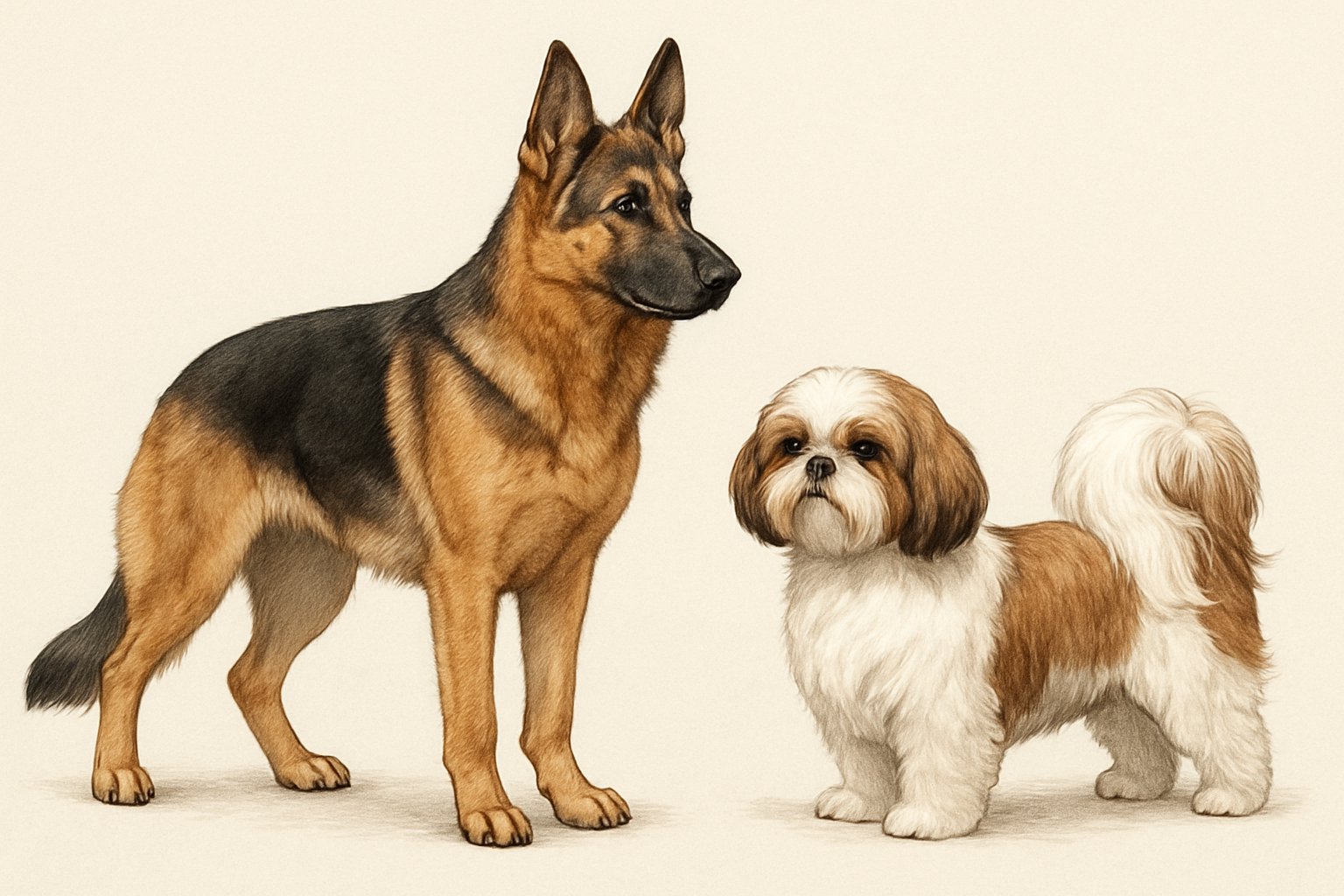
German Shepherds and Shih Tzus look nothing alike. Their size, body shape, and fur set them apart instantly.
Size and Build
German Shepherds are large, strong, and athletic. They usually stand 22 to 26 inches tall and weigh 50 to 90 pounds.
Their bodies are long with a straight or slightly sloped back. A wide chest and deep ribcage help them move fast and work hard.
Shih Tzus are much smaller, reaching only 9 to 10.5 inches in height and weighing 9 to 16 pounds. They’re compact and sturdy, with short legs.
Unlike tiny breeds like Yorkshire Terriers or Dachshunds, Shih Tzus aren’t fragile. Still, you can easily pick them up.
Great Danes and Mastiffs are even bigger than German Shepherds. Poodles and Boxers fall somewhere in between.
Coat Type and Colors
German Shepherds have a double coat: a soft underlayer and a dense, straight topcoat. Their fur is medium in length and sheds a lot, so regular brushing is a must.
Common colors include black and tan, black and red, sable, solid black, and sometimes white.
Shih Tzus have long, flowing fur that can reach the ground if you don’t trim it. They also have a double coat, but it feels silkier.
Shih Tzus come in all sorts of colors: gold, white, black, blue, silver, brindle, and mixes like white and gold or white and black.
Shih Tzus usually need daily grooming and regular trims. Poodles might need even more coat care, while Dachshunds and Boxers have low-maintenance coats.
Distinctive Features
German Shepherds have a noble, alert face with big, upright ears and a long, bushy tail. Their dark, almond-shaped eyes give them a smart, watchful look.
Their muzzle is long and strong, always with a black nose.
Shih Tzus have a round face, short nose, and big, dark eyes that make them look sweet. Their ears droop close to the head, blending in with their long hair.
The tail curls over their back, covered in plenty of fur.
Shih Tzus look very different from other small breeds. Yorkshire Terriers have sharp features, while Poodles have a more narrow face.
German Shepherds show a confident, powerful presence, a bit like Mastiffs or Great Danes.
Temperament and Personality
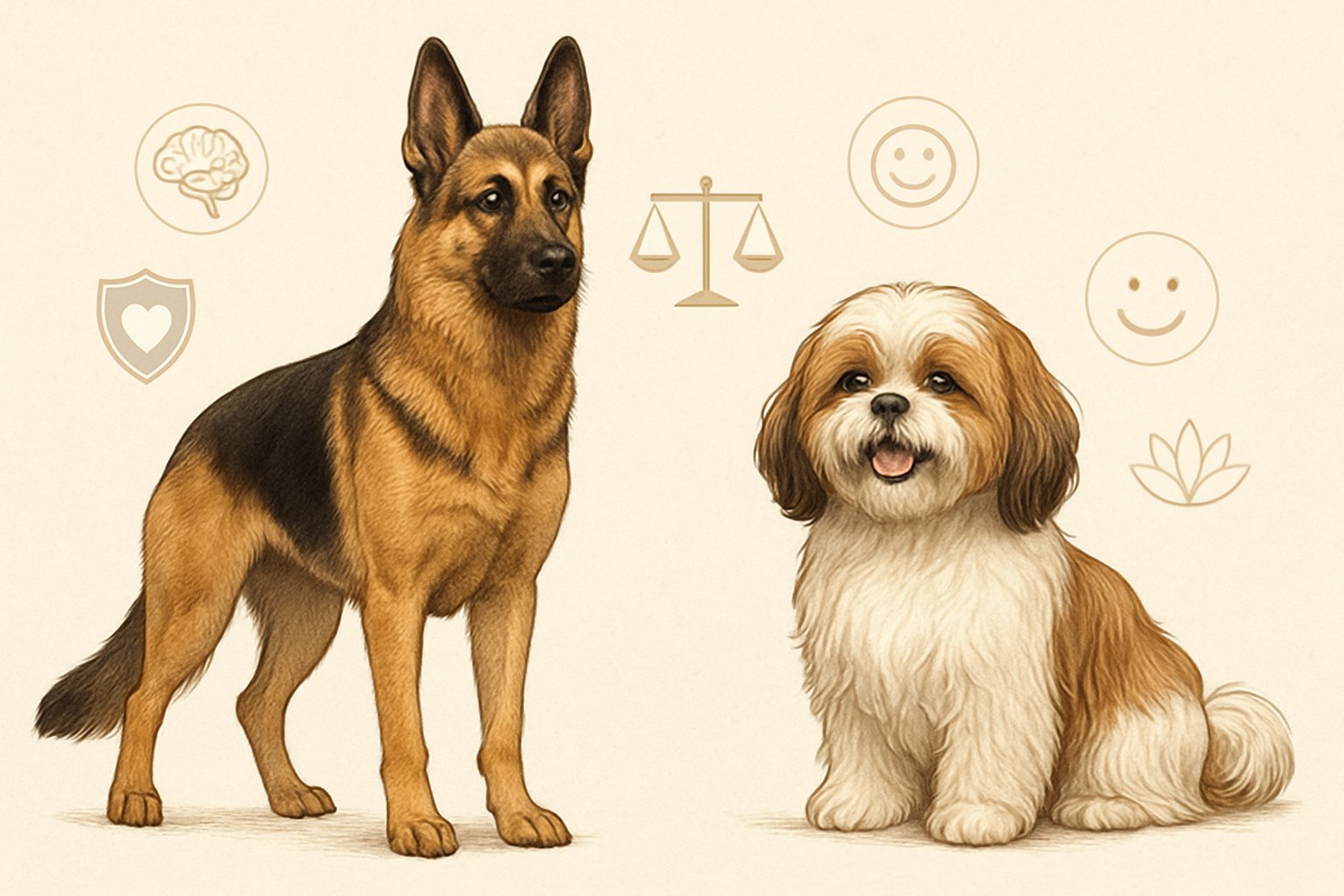
German Shepherds and Shih Tzus have totally different personalities. Both breeds can be affectionate, but their energy levels and social needs set them apart as family pets.
Companion Qualities
German Shepherds are loyal and smart. They bond closely with their owners and like being part of daily life.
You’ll find them alert, eager to work, and protective of their people.
Shih Tzus are classic lap dogs. They’re gentle, loving, and usually prefer cuddling to high-energy activities.
A lot of folks pick Shih Tzus for their calm, friendly presence.
If you want a dog who thrives on activity and structure, go for a German Shepherd. If you’re after a small, affectionate buddy for home life, a Shih Tzu is probably your match.
Interaction with Families and Children
German Shepherds can be great with children if you socialize them early. They’re patient and protective, but their size and energy might overwhelm little kids.
Early training and supervision help teach gentle behavior.
Shih Tzus usually do well with kids, too. Their small size and playful attitude make them popular in young families.
Teach children to handle Shih Tzus gently, since they’re more delicate than bigger breeds.
Both breeds enjoy being around people. Your family’s activity level and the age of your kids might help you decide which breed fits best.
Compatibility with Other Pets
German Shepherds can get along with other pets, especially if they grow up together. Sometimes their herding instincts kick in, and you might see some chasing.
Shih Tzus are more relaxed around other pets. They usually get along with cats, small dogs, or even pets like the Pomeranian.
Early socialization helps prevent jealousy or territorial behavior in both breeds.
If you already have animals at home, your ability to supervise and guide their interactions is key to a peaceful household.
Trainability, Intelligence, and Exercise
German Shepherds are famously trainable and smart. Shih Tzus can be more stubborn and independent.
Exercise needs are really different for these breeds, so it’s good to know what you’re getting into.
Training Challenges and Tips
German Shepherds learn fast and want to please. That’s why police, service, and military jobs often go to them.
They’re one of the easiest breeds to train if you’re consistent and use positive reinforcement. Their intelligence is up there with collies, border collies, and doberman pinschers.
Shih Tzus take longer to train, mostly because they’re more independent. They were bred for companionship, not work.
With patience, praise, and treats, you can teach them basic commands like sit, stay, and come. Keep sessions short and fun to avoid boredom.
Training Tips:
- Start early socialization for both breeds.
- Use rewards, not harsh discipline.
- Keep lessons short for Shih Tzus, longer for German Shepherds.
- Practice in a quiet place with few distractions.
Exercise Needs
German Shepherds are active dogs who need at least one to two hours of exercise every day. They love running, hiking, fetch, and obedience training.
Without enough activity, they get bored and might get destructive. Their needs are similar to Australian Shepherds and Bernese Mountain Dogs.
Shih Tzus don’t need as much exercise. Daily walks and a bit of playtime indoors or in the yard usually do the trick.
About 30 minutes a day is enough to keep them happy.
Here’s a simple table:
| Breed | Exercise Needed | Activity Level |
|---|---|---|
| German Shepherd | 1-2 hours daily | High |
| Shih Tzu | 30 min daily | Low |
Adjust activities based on your dog’s age, health, and energy. Mental stimulation matters too, especially for German Shepherds.
Health, Lifespan, and Care Needs
Health, lifespan, and daily care can be pretty different between these breeds. German Shepherds and Shih Tzus each face their own health risks and grooming needs.
Common Health Issues
German Shepherds often struggle with hip and elbow dysplasia, which can cause pain or trouble walking as they get older. They can also develop degenerative myelopathy, a serious spinal problem.
Other issues include allergies, bloat, or heart disease.
Shih Tzus may have breathing troubles because of their short snout. Dental problems, ear infections, and eye issues like dry eye or cataracts are also common.
Their small size means they’re at risk for injuries if handled roughly.
Other breeds, like Maltese or Bulldogs, have their own health problems. Bulldogs, Pugs, Boston Terriers, and French Bulldogs often have breathing and skin issues due to their facial structure.
Lifespan Comparison
A German Shepherd usually lives 9 to 13 years. They tend to have shorter lives than smaller breeds.
A Shih Tzu lives longer on average, from 10 to 16 years. That’s pretty normal for small dogs, including Maltese and some bulldogs.
Here’s a quick table:
| Breed | Average Lifespan |
|---|---|
| German Shepherd | 9 – 13 years |
| Shih Tzu | 10 – 16 years |
| Maltese | 12 – 15 years |
| English Bulldog | 8 – 10 years |
| French Bulldog | 10 – 12 years |
| Boston Terrier | 11 – 13 years |
| Pug | 12 – 15 years |
Grooming and Maintenance
German Shepherds have a thick double coat. They shed a lot, especially in spring and fall.
You’ll need to brush them at least twice a week. Bathing about once a month usually does the trick.
Check their ears for dirt and wax now and then. It’s easy to forget, but it matters.
Shih Tzus have long, silky hair that grows fast. Daily brushing helps keep tangles and mats away.
A lot of owners just trim their coats short for easier care. Regular eye cleaning and brushing their teeth can help prevent health problems.
Both breeds need nail trims. Regular vet checkups never hurt, either.
Popularity and Choosing the Right Breed
German Shepherds and Shih Tzus come from different backgrounds. People pick them for different reasons.
Popularity, temperament, and lifestyle all play a part in which breed fits best in your home.
Breed Popularity and Rankings
The German Shepherd is one of the most popular breeds in the United States and around the world. It’s usually in the top five, right up there with Labradors and Golden Retrievers.
Shih Tzus are a top pick for folks who want a small, loving companion. While you won’t see them everywhere like German Shepherds, they’re still big names among toy breeds, along with Chihuahuas and Cocker Spaniels.
The American Kennel Club puts German Shepherds in the top five. Shih Tzus usually land somewhere in the top 20.
You’ll probably spot more German Shepherds at parks or training classes. Shih Tzus tend to show up wherever small dogs rule.
Big breeds like Great Danes or Pit Bulls don’t really match the family-oriented temperament or trainability of German Shepherds. On the flip side, toy breeds like Shih Tzus, Chihuahuas, and other small dogs fit better in apartments or for owners who don’t have much space.
Factors for Prospective Owners
Picking a breed really comes down to your lifestyle, space, and how much experience you have with dogs. German Shepherds? They’re working dogs through and through. These pups crave daily exercise, training, and a bit of mental stimulation.
If you’re active or just love spending time outdoors, a German Shepherd might fit right in. But you’ll need to set aside plenty of time for training.
Shih Tzus, on the other hand, just want to be close to their people. They don’t need much exercise at all. You can keep them happy in an apartment, and their small size is a real plus for seniors or anyone new to dog ownership.
Consider the following before deciding:
- Activity needs: German Shepherds really do need more room and time outside.
- Space: Shih Tzus adjust well to small homes.
- Allergies: Both breeds shed, but Shih Tzus usually shed less.
- Kids or pets: With the right training and socialization, both breeds can get along great.
- Care needs: German Shepherds need more exercise, while Shih Tzus demand regular grooming.
At the end of the day, it’s about finding a dog that matches your lifestyle—not just picking the cutest face or most popular breed.

